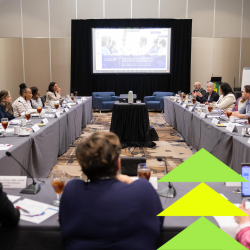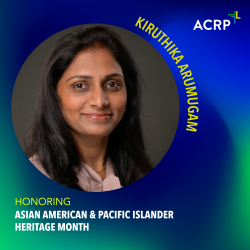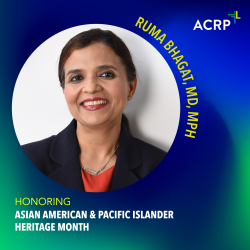Stakeholders in the matter can best leverage cutting-edge options for overcoming the inadequacies of current early talent hiring practices in the clinical research industry if they approach the challenge with the attitude that “it’s not a marathon [to be won], it’s just a race that never ends,” in the words of one attendee of Friday’s (May 3) meeting of the ACRP Partners Advancing the Clinical Research Workforce™ consortium at ACRP 2024 in Anaheim, Calif.
The latest gathering of consortium members from the realms of academia, sponsors, sites, technology providers, non-profit advocacy groups, and regulatory authorities put the focus on defining the skills employers should consider necessary in early talent clinical research hires, assuming the common “two years of experience” standard to be a failed model. This theme was approached by hearing from experts in the field who are studying workforce-related issues in depth, as well as from individuals who are much newer to clinical research and those helping them as mentors and supervisors.
Sharing insights from the soon-to-be released proceedings of the “Preparing the Future Workforce in Drug Research and Development” workshop, which he co-chaired last year for the National Academies of Science, Engineering, and Medicine (NASEM), was Jonathan H. Watanabe, PharmD, MS PhD, BCGP, Associate Dean of Pharmacy Assessment and Quality, Professor of Clinical Pharmacy, and Director of the Center for Data-Driven Drugs Research and Policy at UC Irvine.
Noting that one of the workshop’s goals was to “examine the current landscape of U.S. academic, government, industry, and professional society training programs for preparing the next generation of drug research and development researchers and clinicians,” Watanabe highlighted the challenges of making such training scalable, person-centered, and fit for purpose across many different types of research settings. “There is momentum from multiple agencies, stakeholders, and forums to generate and sustain meaningful change” in workforce development, he explained. “We must maximize the potential of this moment and, where possible, facilitate coordination across these groups to drive sustainability. …We need data on the current workforce [to see] how it is changing and to identify current and future problems.”
More than 500 people, including ACRP Executive Director Susan Landis, from 36 states and 13 countries were part of the NASEM workshop last October. The proceedings and a related interactive webpage should be made available by NASEM staff in mid-May, Watanabe said.
Landis presented the assembled PACRW members at the ACRP 2024 meeting and others who joined online with aspirations for a call for collective action to address the clinical research workforce crisis. Among the elements of such a call, she proposed expanding on the need and rationale for workforce diversity, establishing that success ultimately depends on a constellation of solutions within an integrated framework, and asking stakeholders to unite in tackling the fundamental causes of the crisis—including a plea to the pharmaceutical industry to invest in early talent and support sites.
Sharing stories of success tied to training initiatives at various institutions were Darius Fullenwinder, a student laboratory assistant at Clemson University who recently participated in ACRP’s Early Talent Training Program (ETTP) through Merck, along with his Merck mentor, Adam Penna, JD, Associate Director of Clinical Operations; Heather Manley, MS, LPC, who leads an internship program and is a Site Director for Clinvest Research, a Headlands Research Site; and Adriana Delgado, a Clinical Research Associate at the UNC School of Medicine and winner of an ACRP Continuing Education Grant to Support DEI, who overcame multiple life challenges as a Mexican-American mother of four and garnered support from previous employers to eventually earn a bachelor’s degree in clinical research from North Carolina Central University.
“I have been lucky to encounter people who saw the best in me [as I worked toward entering the clinical research field], even if I didn’t realize it at the time,” Delgado said. “Once I set my mind to something, I will do what I need to get it done. I want to set a good example for my own kids…and inspire other people in my life. [My message is to] give people a chance. How can you expect someone to have experience if you don’t give them a chance?”
Author: Gary Cramer



